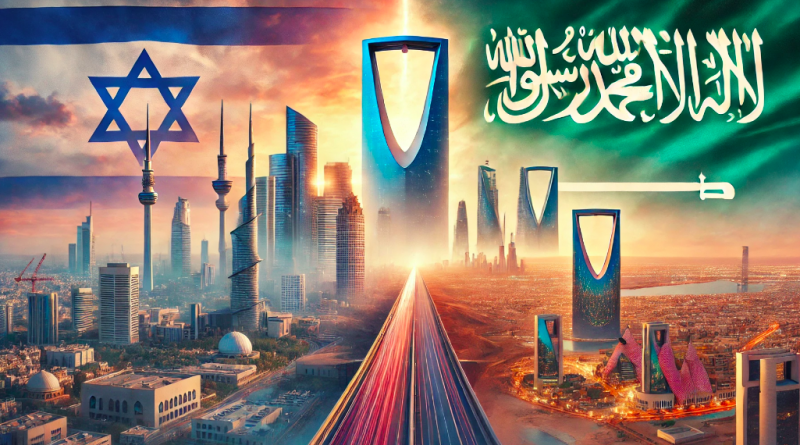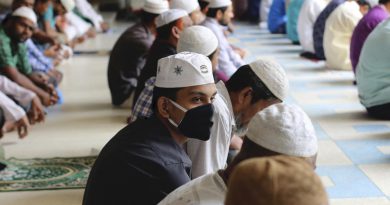Normalization in the Shadows: Between Saudis and Israelis—Facts, Projects, and the Future of Gaza
By Sharon Nizza (English by Eli Bar-On)
Normalization between Israel and Saudi Arabia has not been entirely derailed by the October 7 attacks, but it has undoubtedly been put on hold due to the political and humanitarian sensitivities of the war in Gaza
For many months, since the beginning of the ongoing war between Israel and Hamas, the desolate departures board at Ben Gurion Airport has told us a story: in the face of countless flight cancellations by international airlines, one of the few destinations that is always present is the United Arab Emirates, which, through the low-cost Flydubai and Etihad flying to Abu Dhabi, has replaced Istanbul as the main hub for travelers departing from Israel.
Today – while global airlines are starting to reschedule this route – there are fifteen daily flights Israel-Emirates. All of them, including those of the three Israeli airlines, fly over Saudi Arabia, a concession that drastically reduces the duration of the flight, which was already made by Riyadh back in September 2020, with the signing of the Abraham Accords and has never been revoked since.
The propensity towards the much-discussed normalization between Jerusalem and Riyadh can also be measured through the Middle Eastern sky, which has witnessed much more dramatic cooperation that took place in the context of the broader war of the “axis of resistance” led by Iran against the Jewish State and then formed by Gaza, Iraq, Yemen, Syria and Lebanon – today, due to the unprecedented domino effect triggered after the attack of October 7, Syria and Lebanon are trying to relocate themselves within Riyadh’s Sunni sphere of influence, and as far as Gaza is concerned: it is the fulcrum of the ongoing negotiations.
To counter the Iranian missile and drone attack on the night of April 13 last year, Jordan and Saudi Arabia also did their part, guaranteeing freedom of maneuver in their airspace to their allies. Even before that, Riyadh, which did not formally join the coalition for the defense of the Red Sea maritime route against the Houthis, intercepted missiles launched by Yemen against Israel on its territory.
Every now and then, a strategic meeting at the highest levels is leaked: for example in June, when journalist Barak Ravid revealed that the IDF Chief of staff secretly met with senior figures from the Saudi army in Bahrain, under the aegis of Centcom.
Several indicators tell us that the “flirt” between Israelis and Saudis continues, despite the images of devastation arriving from Gaza and the public statements of Arab leaders.
“The fact that silent normalization continues during the war is an important sign of the strong interests behind this alliance”, tells Prof. Elie Podeh of the Department of Middle Eastern Studies at the Hebrew University of Jerusalem, and author of an illuminating book, “From Mistress to Known Partner: Israel’s Secret Relations with States and Minorities in Middle East, 1948-2020”, which maps the complex dynamics that have led Israel, since its foundation, to establish relations with its neighbors.
“Normalization has many faces. One model is characterized by bilateral, mostly secret, relations without the establishment of diplomatic relations. This is the situation Israel repeatedly found itself in immediately after its declaration of independence, up to the peace agreements with Egypt, Jordan, the Oslo Accords and finally the Abraham Accords.”
“Peace is not just a one time event signed on the lawns of the White House, but rather a process slowly cooked over low heat for years”, adds Ohad Merlin, Middle East correspondent for the Jerusalem Post. “For instance, in the case of Israel and Jordan, even during wartimes, King Hussein and the Israeli leadership were on good terms, slowly building trust over the years until the signing of the peace agreement in 1994.
In more recent cases, Israeli delegations to business forums, sporting events and international organizations were present in some of the Gulf countries, again building trust and even friendships between people. However, despite the positive outlook, for a prosperous and lasting peace, it is necessary to emphasize the importance of education for tolerance both in the media and in the educational system: the normalization of the very existence of Jews, Israelis and the Jewish State in the region is directly related to processes of deradicalization, openness and tolerance”.
And so, while last December the Chabad Jewish community lit a candelabra for the first time in the heart of Riyadh for the holiday of Chanukah – for years it has distributed kosher food in the Saudi Kingdom to the large community of Jewish expats – some indicative changes can also be noted in the education sector. Last May, a study revealed that the Saudi Ministry of Education had made significant changes to the current school curriculum, removing much anti-Israel (and anti-Semitic) content from textbooks.
The 267-page report by IMPACT-se, an NGO based in London and Tel Aviv that analyzes the content of textbooks around the world to encourage peace and tolerance according to UNESCO standards, provides many examples and concludes: “Representations of Israel and Zionism have made further progress. Students no longer learn content that defined Zionism as a “racist” European movement that aims to expel Palestinians, or that Zionism’s “fundamental goal” is to expand its borders and take over Arab lands, oil wells, and Islamic and Christian holy sites in Jerusalem.”
Israel is still not recognized on maps, but, curiously, on many maps the name Palestine, which previously indicated the entire area from the “river to the sea”, has been removed and the area remains unnamed. The same process of deradicalization of school textbooks had been monitored by the NGO since 2014 in the Emirates, which in 2023 became the first Arab country to officially include some elements of study of the Holocaust in the school curriculum.
Abdalaziz Alkhamis, a Saudi journalist based in the UAE and a well-known face on Sky News in Arabic, confirmed to Il Foglio that “normalization between Israel and Saudi Arabia has not been entirely derailed by the October 7 attacks, but it has undoubtedly been put on hold due to the political and humanitarian sensitivities of the war in Gaza”.
“Saudi Arabia publicly condemned Israel’s military actions and halted formal normalization talks, but indirect diplomatic backchannels remain open. While overt collaborations have decreased in visibility, business and security-related exchanges between private Saudi and Israeli entities have not completely ceased”, Alkhamis added.
Someone who knows something about trade exchanges with the Saudis is Dr. Nirit Ofir, an Israeli researcher specializing in the Gulf countries, who has organized countless delegations to Saudi Arabia with participants openly identified as Israeli, starting in 2021 with the Rally Dakar, up to the delegation of 12 companies in the cyber sector (including flag at the Israeli stand) in Dammam, a month before the attack on October 7. “After October 7, everything is slower, but it is not possible to stop the path that has been started”, Ofir, who has never stopped visiting Saudi Arabia even in recent months, tells Il Foglio.
Also interesting in this sense is the work of MENA2050, an organization that since 2021 has brought together hundreds of activists and experts from across the Middle East (including Israelis and Palestinians) to collaborate in offering tangible solutions to the main challenges of the area, primarily climate change and water and food security, sectors in which Israeli expertise is highly valued and sought after.
Eli Bar-On, director and co-founder (together with the Saudi Alkhamis), confirms to Il Foglio that “in Saudi Arabia there is already Israeli technology. The Saudis want to buy it because it is considered high quality. Bin Salman himself has stated that his Vision 2030 includes Israel as an ally, but just six months ago he also said that he fears ending up like Sadat because of this”.
The public street has its weight, but Alkhamis points out that, since the beginning of the war in Gaza, “while the public’s perception has hardened against normalization due to the war, the elite maintains a long-term strategic interest in keeping normalization on the table—though with new conditions and expectations”. Alkhamis points out that the Saudi media has remained moderate on Israel, the problem is instead evident on social media: more openly hostile.
On the media side, another signal has appeared in the last year that also requires a certain amount of deciphering: a series of editorials and interviews published in the Israeli press by Dr. Aziz Alghashian, a Saudi researcher on normalization with Israel. The clear message he sends is that normalization must include “strong, credible and concrete measures that fit into the ‘two peoples, two states’ solution, because the Saudis need internal legitimacy,” Alghashian explained to the people of Israel in the columns of Israel Hayom just ten days ago.
A clear example of soft power diplomacy: his words printed with an open signature on Israeli paper (from the left of Haaretz to the mainstream of Israel Hayom) constitute in themselves a precedent, an act of recognition of the interlocutor, usually “unnamed” (as with maps in schoolbooks). Alghashian also says that “Saudi Arabia’s primary objectives in any agreement will focus on its economic and security interests” and that these are determined by the level of “concessions” that Riyadh must receive “from both the United States and Israel”.
Abdelaziz AlKhamis explains to Il Foglio that Mohammed bin Salman could contribute to the post-war arrangement of Gaza on several fronts: “Financial aid for reconstruction, although probably through international frameworks rather than unilateral initiatives; influence on the new Palestinian leadership that reduces the power of Hamas; deradicalization efforts, in line with the promotion of a more moderate Islam in Saudi Arabia itself, an integral part of Vision 2030”. How this will actually work out is exactly the answer the White House now expects from its Arab allies in the Middle East, after having boosted the negotiations with Trump’s enigmatic proposal on the “Gaza Riviera”.
Original Italian article Il Foglio Daily. Posted in English by Eli Bar-On (Exec. Director MENA2050.
Sharon Nizza is a Middle-East expert. She tweets under @SharonNizza.



